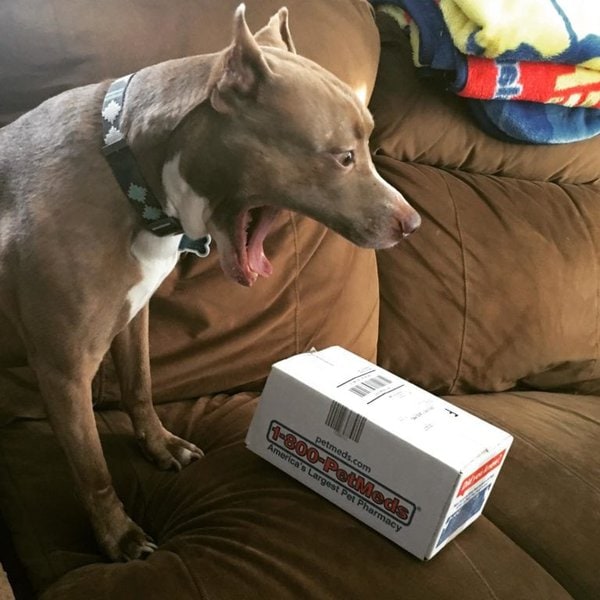Many dog owners are left fearing the worst when they notice their canine companion coughing. If you are one of these, your fears may be founded.
For dogs, coughing can be a natural reaction to irritation. Dogs seemingly can’t resist the urge to sniff at anything they come across—surfaces, refuse, food, and so on. And it would not be out of place for your doggie to draw up some foul smell while rummaging the trash. She can also get dirt up her airway while sniffing at a dusty surface. Coughing can also be a reaction to an allergen.
Nevertheless, incessant cough can be an indication of a serious underlying health issue in your dear fido. And if this is what you notice in your dog, then you have cause to worry. It can be severe if the cough is accompanied by mucus or phlegm; or other symptoms like lethargy and vomiting.
These symptoms can imply a lung or heart disease, caused by an infection. Other conditions such as canine distemper, dog flu, canine tracheobronchitis, and cancer can lead to coughing in your pet.
This post discusses everything you need to know about coughing in your dog. We talk about the possible causes, ways to prevent it, and how to treat it when it happens. To begin, let’s discuss the causes of coughing in your doggo in more detail.
Why Does My Dog Keep Coughing And Gagging?
A respiratory disease is usually the reason behind your pet’s cough. Nevertheless, other non-respiratory issues may also cause your canine companion to develop a cough.
Like humans, dogs are social creatures. They associate with humans and fellow canines. While your dog does not have the emotional range of humans, she can sniff and slurp. This makes her susceptible to picking up germs and microbes.
And like humans, dogs can fall sick. These diseases have many symptoms and coughing and gagging will be among those.
Now, a little digression here as we make a distinction between coughing and gagging. When your dog coughs, she is carrying out an involuntary action in which she tries to expel air from her lungs. It is usually accompanied by a sharp sound.
Gagging, on the other hand, comes in the form of a muzzled sound and is characterized by choking. It can be a sign that your dear fido has something stuck in her throat.
Respiratory Infections
Respiratory disorders are often a result of microbial infections—caused by bacteria, viruses, fungi and parasites.
Different types of microorganisms live in the respiratory tract of your pooch. These are largely harmless because your pet has developed immunity to them.
However, when your doggie gets another infection that weakens her immune system, the hitherto harmless microbes may become dangerous to your dog. This can cause her to fall ill and start coughing, among other symptoms.
Poor sanitation or environmental conditions can increase your pooch’s chances of getting an infection.
Kennel Cough
Kennel Cough is the common name for canine tracheobronchitis, a prevalent infection that attacks the trachea (windpipe) and bronchi (airways) of dogs.
This canine infection has some similarities with the common cold in humans. It is not caused by one particular microbe. Rather, several viruses and bacteria are responsible for this infection in your furry friend.
If your doggie mingles with other dogs around, she can get the infection from an infected dog. Once your dog takes in air or food containing any of these bacteria or viruses, they go to her respiratory tract. Here, they cause your doggie’s trachea and larynx (voice box) to be inflamed. The result is the persistent, forceful choking cough you see in your doggo.
Kennel cough can sound terrible and appear to be painful for your dog. Nevertheless, it is oftentimes a mild condition. Your dog should be able to fight it and recover without treatment in a matter of days. However, if the coughing does not subside after a couple of days, you should get medical help from a veterinarian.
Canine Distemper
Coughing is only one of the numerous symptoms of canine distemper. Paramyxovirus, the virus responsible for the disease, can also affect other mammals such as gray foxes, ferrets and raccoons.
Your doggo will get it from associating with an infected dog or coming in contact with a wild animal. She can also get it if she gets in contact with infected urine, blood, saliva or contaminated food.
This highly contagious disease affects different systems of the body. If your canine companion gets this virus in her system, it can cause damage to her gastrointestinal, immune, nervous, and respiratory systems. If her respiratory system is affected, she may have difficulty breathing and it is usual to notice a hacking cough.
As deadly as distemper is, you can prevent it by getting the appropriate vaccination program for your doggie.
Colds And Flu
Just like in human beings, when your furry friend catches a cold, it is infected with one or more members of a large group of viruses. These viruses are all categorized together because they cause similar symptoms, of which coughing is one. Other symptoms include sore throat, running eyes and nose.
Some of these viruses cause serious illnesses while others are mild. Your dog should be able to overcome most viruses if she has a strong immune system.
Canine influenza, like cold, is also caused by numerous varieties of the influenza A virus. Dogs have not been previously exposed to some of these strains, like equine influenza that is transmitted from horses. Hence, they have not developed natural immunity for them. Therefore, influenza can be fatal for your pooch. In addition, they are airborne and highly contagious.
Pneumonia
Pneumonia is a bacterial or fungal infection that leads to inflammation of the lungs. There are many bacteria that can cause pneumonia in dogs.
The most common of these are Bordetella bronchiseptica, Streptococcus zooepidemicus, Pasteurella multocida, Pseudomonas aeruginosa, Klebsiella pneumonia, Escherichia coli, and Mycoplasma species. Of all these, B. bronchiseptica is highly infectious and your pooch can easily contract it from an infected dog in the neighborhood.
Fungal pneumonia is caused by fungi such as Cryptococcus neoformans, Histoplasma capsulatum, Coccidioides immitis, Blastomyces dermatitidis, Pneumocystis jiroveci, Aspergillus spp, and Candida spp. Your fido can get this disease if she inhales spores. Thankfully, fungal pneumonia is less common in dogs.
A productive cough (one that is accompanied by mucus or phlegm) is a symptom of pneumonia.
Other Respiratory Conditions
Infections are not always the cause of all respiratory dysfunctions. Some may be congenital while the causes of others are still unknown. Here are a few of them.
Chronic Obstructive Pulmonary Disease
Also known as chronic bronchitis, chronic obstructive pulmonary disease is the gradual inflammation of the lung.
The main implication of this condition is the restriction of airflow into and out of the lungs. If your furry friend has this condition, she will find it difficult to breathe. As a result, she will develop a persistent dry cough that can last for an extended period, usually more than a month.
The cause of COPD in dogs is not yet known. Moreover, this condition is irreversible and progressive, which means that it will continue to get worse. The good news, however, is that with early detection and proper health care, the effects of the disease can be mitigated and your dog can live a normal life for as long as possible.
Trachea Collapse
Trachea Collapse is more common in small dog breeds. If you have a small dog like Chihuahua, Yorkshire Terrier, Maltese, and Dachshund, a honking cough may mean that she is suffering from this condition.
Trachea Collapse is the progressive deterioration of the cartilages that make up the wall of the trachea. Once this begins to happen, you will notice the characteristic honking cough from your dog.
The exact cause of this condition remains unknown, although it is believed to be largely congenital. In any case, it is a serious condition and your dear fido may need surgery to extend her life.
Non-Respiratory Diseases
Heart Disease
A heart Disease may be at the heart of your fido’s disturbing cough. Leaky valves or weak heart muscles will put more pressure on your doggie’s lungs and airways and this can be manifested in your dog’s weak, continuous cough.
Many factors can lead to heart disease in your dog. Certain breeds tend to develop heart conditions at some point.
For example, Cavalier King Charles Spaniels are susceptible to acquired mitral valve disease while canine dilated cardiomyopathy is common among Boxers, Cocker Spaniels, and Great Danes. These are congenital conditions and there’s pretty much little you can do to prevent them.
Other factors that can cause heart abnormalities in your furry friend include nutrition, obesity, and age. Infections like heartworm disease can also cause heart problems. Fortunately, many of these can be prevented.
Cancer
A chronic cough that produces phlegm, or sometimes blood, can be an early sign of lung cancer. There are two main types of lung cancer. Primary lung cancer originates from the lung. Tumors can also originate from other parts of the body before spreading to the lung. This type of cancer is known as metastatic lung cancer.
Primary lung tumors are not common in dogs. When they occur, they are usually malignant, meaning they are deadly. Preventing metastatic cancer depends on detecting the tumor on time before it spreads to the lungs. This is why it is important to seek the help of a veterinarian once you observe your pooch coughing.

How Do I Know If My Dog’s Cough Is Serious?
There are many indicators of serious cough in your dog. If your dog has a strong immune system, she will be able to overcome most coughs and get better in a matter of days. However, the underlying causes of some coughs can prove a bit too strong for your canine companion.
Chances are that your pooch is ill and requires urgent medical attention if:
The Cough Is Persistent
If the condition is mild, your furry friend would be able to shrug it off after a couple of days and the cough would disappear swiftly. However, if the cough persists for more than four days, you should fix an appointment with a veterinarian.
Persistent coughs in dogs can be symptoms of serious health issues like lung inflammation and COPD.
Your Dog Is Coughing Up Fluids
When your dog coughs up phlegm, mucus or blood, it is known as wet or productive cough. In extreme cases, you may also observe mucus coming out from your fido’s eyes and ears. This is a symptom of infections like distemper, flu, and pneumonia.
You Know The Sound Of Your Dog’s Cough
Knowing how to decipher the different kinds of sounds that canines produce when they cough can also help you to know if your dear fido’s cough is serious.
A hacking cough is mild, usually indicating that your dog is trying to get rid of a foreign body stuck in her throat or mouth. On the other hand, a honking sound—think of a goose honk—may point to tracheal collapse.
Your Dog Has Breathing Problems
Together with the cough, your doggie may also find it difficult to breathe. This condition, known as dyspnea, will make it impossible for your pooch to receive enough oxygen into her body system. Hence, it is a grave issue that requires immediate medical care.
The Cough Is Accompanied With Other Symptoms
Symptoms like lethargy, vomiting, gagging, loss of appetite, and weight loss definitely point to a serious underlying condition that needs urgent medical attention.

What Is The Best Cough Medicine For Dogs?
There is no single best cough medicine for dogs. Coughing is only a symptom of an underlying medical condition in your dog. Therefore, a holistic approach to getting rid of the cough should involve treating the underlying cause of the cough.
Since respiratory dysfunction is oftentimes the cause of coughing, getting a veterinarian to detect the medical condition responsible for the cough is the best thing to do.
In the meantime, you can use a cough suppressant to ease the cough. One reliable drug for dog cough is dextromethorphan.
Dextromethorphan
Dextromethorphan tackles bronchial irritation in dogs. In simple terms, it suppresses coughing in your dog. This drug is only effective for a short period; it is not a permanent solution to coughing in your pooch. However, it is very effective and helps to minimize the pain in the throat and airway of your dear fido.
Besides, Dextromethorphan also does a great job of loosening and reducing mucus, and you will find it useful for your doggie’s nasal discharge.
Dextromethorphan has its side effects. Your dog may feel nauseous or dizzy after taking it. Mild sedation is another common side effect of the drug. Some dogs are also allergic to dextromethorphan.
You can get dextromethorphan over the counter. However, it is advisable to only use it for your dog after consulting with your veterinarian. You also need to administer the right dosage.
Natural Remedies
Apart from dextromethorphan, several natural remedies can help to boost the immune system of your doggie. Some of these include;
Probiotics And Prebiotics
Probiotics are beneficial microorganisms that you can use to diversify the microbiome in the gut of your canine companion. Microbiome refers to the entire microbial community in your dog’s body. A diverse microbiome allows your dog to develop resistance to a very wide range of infections and diseases.
Hence, probiotics are more of preventive treatment for cough. Nevertheless, you can also use them to cure coughing in your dear fido.
Prebiotics are the food components that support the growth of probiotics. Probiotics ferment Prebiotics to produce short-chain fatty acids (SCFAs). These SCFAs help to boost your doggie’s resistance to diseases.
Homeopathic Remedies
You can also resort to homeopathic remedies to treat cough in your canine companion. Many of these remedies are quite effective and cure cough in record time.
When choosing the right homeopathic remedy for a cough, focus on the symptoms rather than the cause. Rumex crispus will cure wet and persistent coughs, Spongia tosta and Phosphorus work for dry, hacking coughs, and Bryonia is suited for deep coughs. There are many other remedies that you can use to treat cough in your four-legged furry friend.
Can Benadryl Cure Cough?
You might have heard someone talk about using Benadryl to cure cough in their dog. Perhaps, they sold you stories of its efficacy. And you’re now contemplating on using it. Don’t. Benadryl is not an anti-cough drug. It is an antihistamine that provides relief for motion sickness and allergies. It cannot cure coughing in your pooch.
Nevertheless, some veterinarians can recommend this drug as part of heartworm treatment. This is to prevent allergic reactions that are associated with such treatment. Benadryl’s use in heartworm treatment may explain the erroneous belief that it cures coughs.






